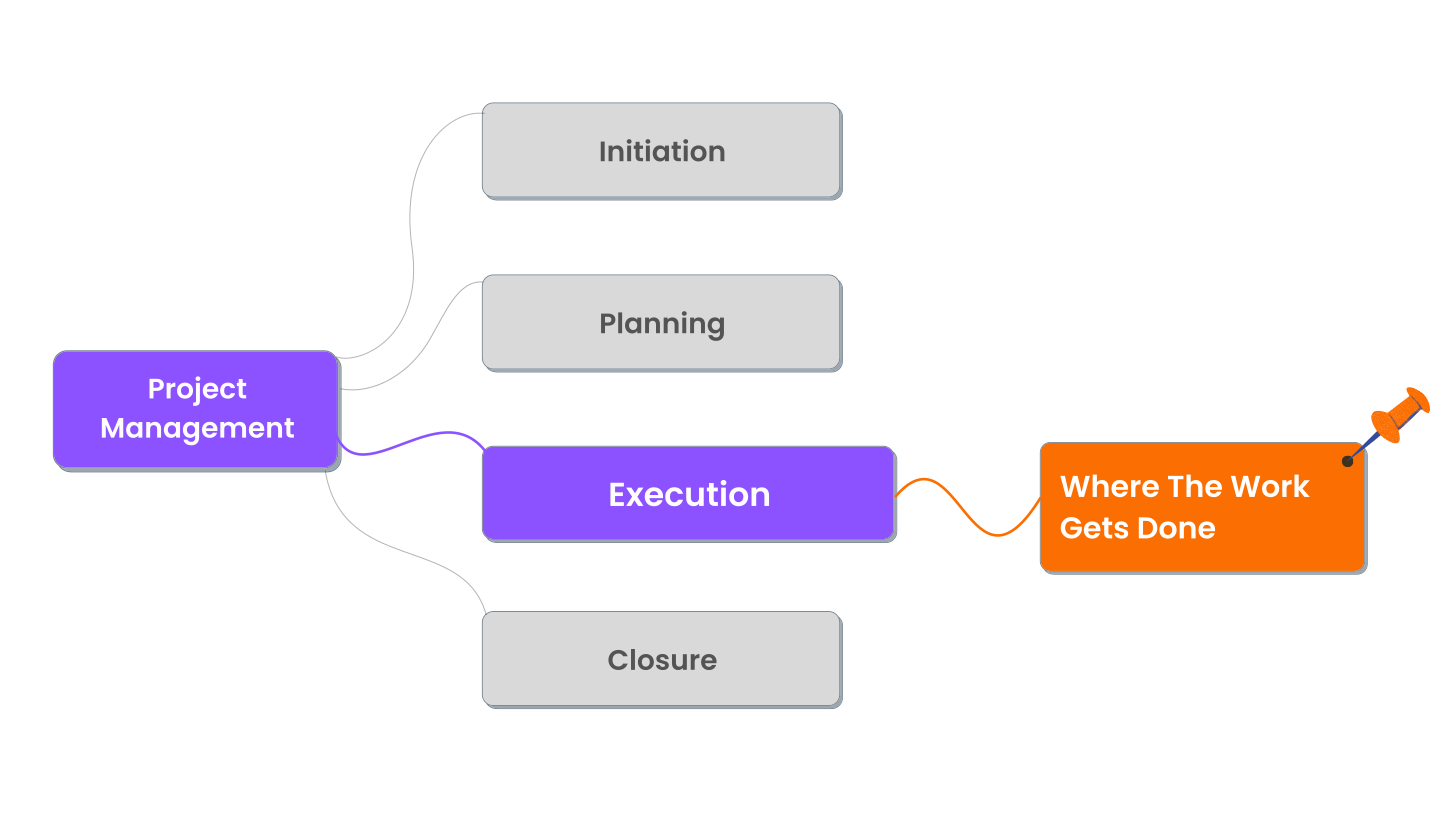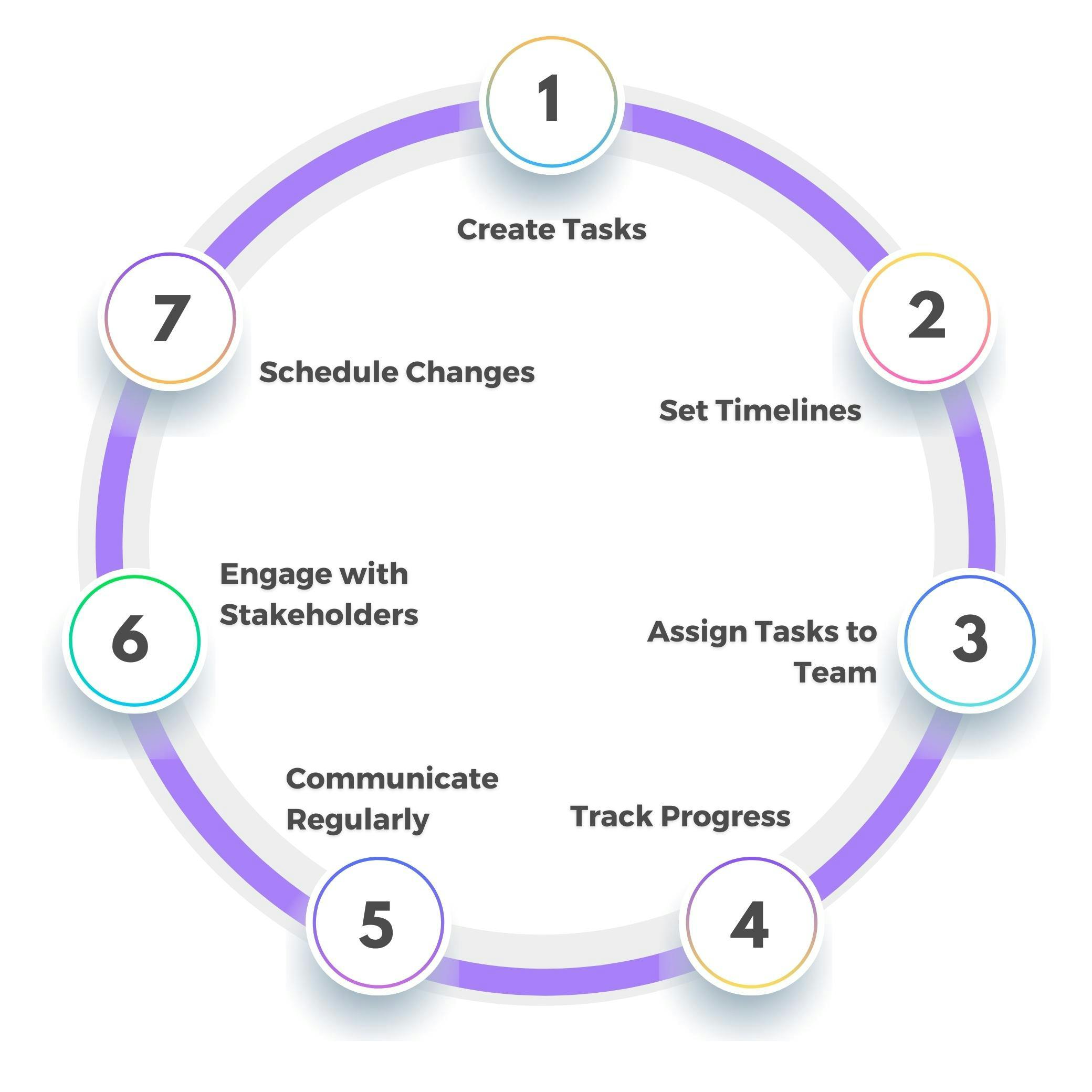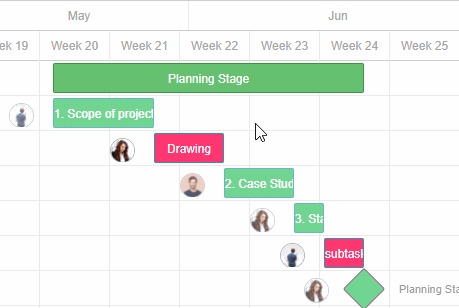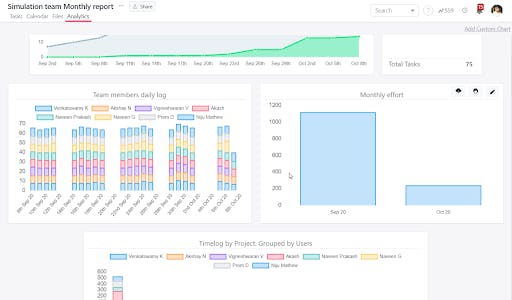 SmartTask
SmartTaskContents
A Practical Guide to Project Execution
By Nidhi ParikhDec 23, 2021

Project execution continues to be one of the toughest phases in the project roadmap.
To make this process easy, we have formulated a step-by-step plan that works perfectly for any project.
What is Project Execution?

Typically, a project management life cycle includes four stages:
Initiation - Where initial research is done, project scope is approved, and stakeholders are identified.
Planning - Where you create a plan, set goals, determine end results, and finalize the team for the project.
Execution - Where you break down the project into smaller milestones, assign them to the team, start the work, collaborate, and reach the end goals of the project.
Closure - You evaluate the results, check for quality, and deliver them.
Although the other stages are important, the project execution stage is where the actual work is done. Hence it is critical for the entire project.
The following step-by-step process will help you achieve perfect execution by significantly improving timelines, stakeholder satisfaction, and value delivery.
The 7-Step Project Execution Plan

Step 1: Create Tasks
Creating tasks by understanding your project plan is the essential first step in project execution.
This is how you can do it.

Define each task
Start by creating a work breakdown structure (WBS) that decomposes your entire project into smaller actionable tasks.
For example, a product marketing campaign can be broken down into buyer persona research, choosing promotional channels, creating marketing collateral, and going live.
The manager then defines the work for each task, like buyer persona research, with details such as how to gather demographics, when to conduct surveys, and where to collate the data. This results in a streamlined process for the project.
Create subtasks
Let’s say you are a recruitment agency hiring for multiple positions.
Each position (the task) will have multiple subtasks, such as getting the job description from the client, ideal candidate expectation, and posting the requirement across job portals.
Creating these tasks and subtasks in your work or project management tool will make it easier to assign, track progress and manage the project.
Enrich with custom fields
Let’s take a laptop service request example.
A typical service request goes through warranty check and diagnostics as the first step. Then the request and the device are handed over to the engineer, who resolves the issue.
This process, which is often cumbersome, can be streamlined better by creating a dropdown custom fields to track the different stages a service request is in.
A good collaboration software would allow you to add more details to each task with help of customized columns or custom fields.
Step 2: Setup the Timeline
If maximum productivity is your expectation, then you should set up timelines for each task. Without them, you can never reach your set goals or milestones.

Here’s how you can do it:
Set start and finish dates for each task
No matter how small or big the task, one has to set realistic deadline expectations for each task.
Suppose you are an IT manager with multiple open tickets.
You have to set the start and finish dates of each ticket in your project management tool, so you can convey to users when their issues will be solved.
Set priorities
Given the dynamic nature of project execution, situations arise where some tasks need to be prioritized over everything else.
For example, the operations team may need to procure an item on an urgent basis or the project would come to a halt. Here the project manager has to ensure the task is prioritized and the item reaches the site on time.
In such cases informing the concerned department is critical. A good collaboration tool will notify the concerned person on mobile, email and within the desktop app, as soon as the priority of the task is changed.
Create dependencies

Some tasks and subtasks will remain dependent on others.
For example, in a web design project, the copywriter cannot create a copy without the wireframes. Likewise, the designer needs guidelines from the brand manager for creating these wireframes.
A good project management tool would track these changes and automatically schedule the dependencies if one of the tasks in the chain gets delayed.
Create milestones
A milestone is a culmination of multiple tasks and subtasks which marks an important achievement in the project.
Let’s say your sales team has to generate $120,000 for the quarter. You can divide this target into 3 milestones of $40,000 each, and whenever the sales team reaches a milestone, you know you are getting closer to the end goal.
Step 3: Assign tasks to team
Now that you have all the tasks, sub-tasks, and timelines setup, you need to start assigning them to the team and execute the project.

Start by Inviting team members
Invite all the selected team members to the project, give them a brief and explain their roles.
If you’re using a work management tool, then select these employees and add them to the project team.
You can also cut down on the explanation part by attaching the brief and relevant resources to each task.
Invite external collaborators
Every project will have external collaborators and agency partners. They may be roped in for expertise, filling a skill gap, or for some extra hands.
You can invite your external team as guests and give them access to necessary tasks or projects.
Your internal and external teams should now be able to communicate and collaborate on the project in real-time.
Assign tasks as planned
Once you have invited all the team members, start assigning the tasks to them according to their roles.
As you have already created tasks, set timelines & priorities, assigning them will be done in a matter of minutes.
Provide all necessary resources
Your team cannot execute the project without the necessary resources.
For example, a digital marketing manager will need SEO tools, keyword planning sheets, and other essential documents to execute the SEO work.
These resources have to be provided upfront so the work does not get hampered along the way.
Step 4: Track Progress
Tracking the progress of tasks assigned to your team is critical. It determines if the project will complete by the deadline or not.

Here’s how you can effectively track progress.
Check on the tasks daily
Suppose you are an operations manager of a service center, where executing daily tasks is critical for the business.
You have to ensure your team is logged in on-time, completing service requests, and updating the number of service requests on time. Failing to check on these things will result in a catastrophe.
Likewise, every project will have daily tasks, and checking on these daily tasks for timely execution is critical.
Generate weekly reports
Weekly reports, especially through dashboards (like the one above), will give you perfect knowledge on the progress of each task and the project as a whole.
Weekly reports would also keep the management and clients updated on the project’s progress. This helps avoid any surprises.
Identify bottlenecks
A lot of time you would find your colleagues stuck on a particular task. Maybe they need necessary information or guidance on how to execute the task.
This is where conversing within the task compared to in-person or on email is more effective. As communication is always in the context of the task.
This also prevents miscommunication.
Create automated check-ins
Manually checking on repetitive tasks with every team member can be daunting.
So, why not create automated check-ins?
Let’s say you need to know hot-leads from the sales team every week. Instead of asking each team member, you can create an automated check-in where they can update their numbers instantly.
Step 5: Communicate Regularly
Communication plays a crucial role during project execution.
So, here’s what you need to do.
Setup a communication network
Instead of opting for multiple tools for communication, use one work management tool that enables real-time conversations with chats, calls and video conferences.
It saves a lot of time spent in juggling between tens of applications and improves productivity of your team.
Conduct regular meetings
Regular meetings with your team, to gauge the progress on individual tasks and the status of the overall project, are essential.
They provide insights into real-time issues.
Scrum teams do a great job at this. They have regular stand-up meetings for around 10-15 minutes where they understand how the project is proceeding.
Another key benefit of regular meetings is that it develops team spirit. Project managers can take this opportunity to boost the morale of the team and keep them motivated.
Converse in real-time
If your team gets stuck in a problem, they should be able to resolve it instantly through real-time conversation and collaboration.
For instance, if a team-member is facing a challenge he can immediately tag a colleague for help within the task itself.
A good work management tool offers both an instant communication channel like chat interface and an async communication channel like task comments.
Step 6: Engage with External Stakeholders
External stakeholders, such as your clients, need to know what’s happening with the project on a regular basis. Here’s what you can do:
Give them guest access to project data
Let’s say you are managing an agile development project. You can invite your clients in your project management tool and give them guest rights to critical dashboards.
One such dashboard can be your product burndown chart, which illustrates the product goals achieved so far and the work left.
Such insights will reassure your stakeholders that the project is proceeding as planned.
Introduce key members of the team
Let’s be realistic. Your external stakeholders do not have to converse with everybody in your team. They just need important updates.
So, introducing key members such as your product owner or your team lead, will suffice their requirements.
Share important updates regularly
You have to communicate with your clients and external stakeholders regularly and give them important updates.
While dashboards give a bird’s eye view of what’s happening, it may not give them any specifics they’re looking for.
One of the best ways to tackle this problem is by updating the project's status with a status description.
Tools like SmartTask allows you to update project status which also gets reflected in the portfolio view.
Step 7: Schedule Changes Effectively
Scope creep is part of every project. There’s no escaping from that.
Your stakeholders are bound to come up with additional requests that will definitely affect your scheduled tasks.
So, what’s the solution?
Start by understanding the changes
Discuss with your stakeholders on why the change is required and by when they are expecting the change to happen. By doing so, you’d know where to fit the new request within the project lifecycle.
However, there are times when stakeholders will demand changes to be done ASAP.
In such cases, you will have to oblige their request and give them higher priority.
Assign the right team members & communicate changes
Every team has some rockstars who can handle multiple requests and put on different hats.
For example, a full-stack developer who can handle backend requests can quickly switch to working on a UI change that the client demands.
It is important to identify such members of your team, communicate the changes effectively and assign the immediate task to them.
Set realistic timelines & inform stakeholders
Some changes can be done in a day and some can only be done in a fortnight, without losing quality.
You and your team will be the best judges of these timelines.
You’ve to communicate the same to the stakeholders regardless of how demanding they are. Doing so will set realistic expectations for your stakeholders and your team.
Follow these 7 steps - you will be able to achieve brilliant results.
However, in addition to this, there are few things which you should do. We call it the rules of thumb for the execution phase.
8 Rules of Thumb for The Project Execution Phase
Project managers need to have critical and soft skills to be effective during the project lifecycle. These skills help in establishing and maintaining relationships with team members, peers, internal stakeholders and external stakeholders.
To achieve such relationships and become a strong leader, you have to adhere to the following rules:
- Be Empathetic
- Be Adaptable and Flexible
- Document Everything
- Thrive on Problems (Be a Critical Thinker)
- Communicate Clearly and Calmly
- Be a Lovable Taskmaster
- Don't be a Box Checker
- Stay Laser Focused on Goals
Best Tool To Implement Your Project Execution Plan - SmartTask

SmartTask is the Swiss Knife of project execution.
You have all the essential tools in one application to get your project work done on time.
Here are some amazing things you can do:
- To-do Lists: Create multi-functional lists for day-to-day work.
- Work management: Easily breakdown projects into tasks & subtasks and assign them to teams.
- Customized Views: View tasks your way - List, Board, Timeline or Calendar
- Custom Fields: Add relevant information through customized dropdown, text, number or date fields.
- Portfolio View: Portfolio gives you an eagle’s eye view of all your ongoing projects with their corresponding statuses and predicted completion date.
- CRM: Track your sales inquiries within SmartTask with predictive sales analytics.
- End-to-End Communication: Communicate with your teams and stakeholders through video conferencing, VoIP calls, chats, forums and comments.
- Automation: Create automated check-ins to track your team’s progress.
- Dashboards: Create custom dashboards with customized bar, line or bar chart.
- Guest Collaboration: Invite external collaborators and stakeholders with comment or edit rights.
- and much more!
Don't trust us?
Here's what one of our enterprise customers had to say:
Ironically, ABB is a Swiss multinational company headquartered in Zurich. 😊
So, try SmartTask for project execution today and impress your stakeholders.
By the way, it is free forever!
You Can Also Read:
Get a free consultation on project execution







